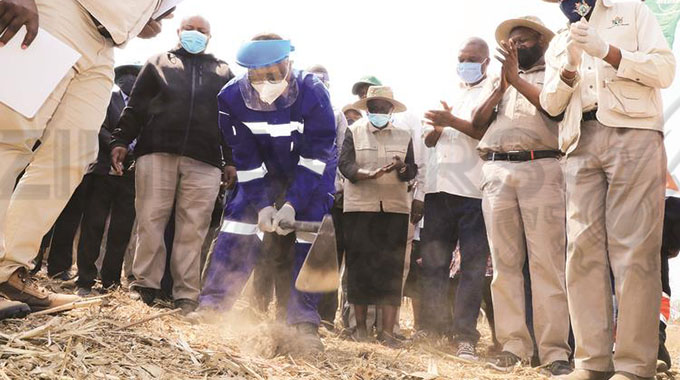Source: Targets set for Pfumvudza farmers | The Herald

Elita Chikwati Senior Reporter
Small-scale farmers across all eight rural provinces have been given the target of 1.8 million tonnes of cereals and 360 000 tonnes of oil seeds in the forthcoming summer cropping season under Pfumvudza, the climate-proofed upgrade of the Presidential Inputs Programme.
The development is expected to give a vast swathe of households not just food security, but also income from surpluses and cash crops to boost national standards of living.
Under Pfumvudza, each of the rural provinces has to average 225 000 tonnes of cereals and 45 000 tonnes of oil seed at one tonne of grain and 200kg of oil seed from the average small-scale farming household.
This will not only produce almost 90 percent of the annual national food requirements, and ensure that once the A1 and A2 farmers, who fall under Command Agriculture if they need Government guaranteed bank finance, have built on that very broad base pushing Zimbabwe into surpluses, but also ensure industry has required raw materials and larger markets.
Vice President Constantino Chiwenga officially launched Pfumvudza at Nyabvuti Farm, in Chief Chipuriro’s area in Guruve yesterday, the event marking the early start this year of the distribution of agricultural inputs under the programme so farmers have time to plant, grow and reap their crops.
Under Pfumvudza, smaller household farms are expected to plant three small fields, harvesting at least one tonne of maize and traditional grains from two plots and at least 200 kilogrammes of oil seed from the third.
The launch was witnessed by Mashonaland Central Minister of State Monica Mavhunga and Lands, Agriculture, Water and Rural Resettlement Minister Dr Anxious Masuka and his two deputy Ministers Vangelis Haritatos and Douglas Karoro, and Members of Parliament, senior Government officials, seed house representatives and farmers.
This year, only those farmers who have adopted Pfumvudza will benefit from the inputs programme, but almost all have now undergone the required training, meaning that they just have to apply their new knowledge to benefit.
Vice President Chiwenga handed over this first batch of inputs, a record early start for distribution, to the first farmers and assigned the local share of a large consignment of motorbikes to extension officers in Guruve.
He said it was a top priority of the Second Republic to ensure the country and households had adequate food throughout the year in the face of climate change and other variabilities.
Farmers had to adopt conservation agriculture to reduce the negative effects of climate change.
“In this regard, all smallholder farmers should adopt the Pfumvudza programme, which will contribute significantly to the attainment of food and nutrition security for the majority of our people in the rural areas.
“The thrust of Pfumvudza programme is to climate-proof dry-land smallholder agriculture. The programme seeks to increase productivity through concerted efforts by our farmers to adhere to recommended good agricultural practices such as mulching, population density management, fertilisation and general crop maintenance,” he said.
Pfumvudza was adopted by Government to address the problems of low production and productivity, which continued to negatively affect the food security situation in Zimbabwe. The second major gain was to inspire the commercialisation of smallholder farming in the country, giving all rural families an income.
The low productivity experienced over the past decade has led the country to be a perennial importer of grain to meet local consumption. This increased pressure on the fiscus to commit the scarce foreign currency to grain importation which could have been channelled to other sectors of the economy.
“The low productivity is a result of successive poor rainfall seasons, prolonged mid-season dry spells, early cessation of the rains and poor agronomic management practices. Hence the need to adopt the Pfumvudza programme which is based on conservation agriculture principles to climate-proof the food-production sub-sector.
“For a farmer to become a beneficiary, all the necessary land preparatory activities such as holing out and mulch harvesting should have been completed by August. This forms the criteria for beneficiary selection,” he said.
VP Chiwenga called upon provincial Ministers of State to work closely with the Ministry of Agriculture, farmer associations, political leadership, local leadership, farming communities and any other stakeholders to achieve the set target.
He applauded President Mnangagwa for sourcing the motorbikes for extension officers as this will improve their mobility and improve farmer training.
Minister of Lands, Agriculture, Water and Rural Resettlement Development Dr Anxious Masuka paid tribute to the late Minister Perrance Shiri and urged farmers to continue with the Pfumvudza programme that was started by Minister Shiri as a way of remembering him.
“Our soils are now tired and there is need for soil testing so we can correct the pH (acidity or alkalinity),” he said.
“We should not be a laughing stock due to low food production. But we should inspire other countries to emulate land reform through improved productivity,” he said.
Host farmer, Mr Abel Masunda said he had been using conservation agriculture for the past five years and has seen its benefits. “I have been growing my crops using the Pfumvudza method. I now apply less fertilisers as I now depend more on manure. From my half hectare plot I harvested four tonnes,” he said.
COMMENTS